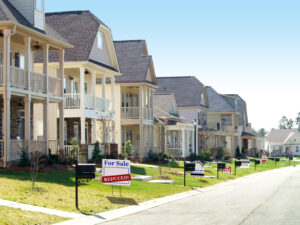Sharestates presents our new Southcentral Regional Sales Director Joshua Druce. Joshua lives in Lancaster, Pennsylvania, and is building our investor network south of New York, north of Washington D.C., and from the east coast of New Jersey to Pittsburgh. His deep knowledge of real estate trends in the region will benefit investors looking for financing.
The Lay of the Land
The largest city in the region is Philadelphia. With a population of over 1.5 million, there is a lot of opportunity for investors in the City of Brotherly Love. It’s one of the three regional cities labeled Eds and Meds by PwC and the Urban Land Institute in their 2022 Emerging Trends in Real Estate report. The category is defined as major urban centers with sizable education and medical hubs.
Overall, the real estate opportunities in these markets have declined since the pandemic disrupted the Eds and Meds hubs. However, Philadelphia—the largest city in the category—has something else going for it.
 With a strong presence in the telecommunications and financial services sectors, Philly’s real estate market is among the strongest in Eds and Meds category. It’s the only city in the category among the top 30 real estate markets in the country, according to PwC. But the real opportunity for investors is in smaller towns such as Lancaster, about 75 miles west of Philadelphia.
With a strong presence in the telecommunications and financial services sectors, Philly’s real estate market is among the strongest in Eds and Meds category. It’s the only city in the category among the top 30 real estate markets in the country, according to PwC. But the real opportunity for investors is in smaller towns such as Lancaster, about 75 miles west of Philadelphia.
“Lancaster used to be a ghost town,” Joshua said. “When we said we were going to the city, we meant Philly because nothing was going on in Lancaster. Now, there’s plenty to do here.”
The New York Post called it the next Brooklyn because of its rich culture, culinary delights, and community design. The work-from-home and work-from-anywhere trends sparked by the pandemic last year have led to many people leaving large urban centers like Boston, Manhattan, and Los Angeles, and planting themselves in places with a lower cost of living. That trend has benefited smaller towns like Lancaster, Harrisburg, Reading, Allentown, and Lititz, all in Pennsylvania. In a 2013 survey, Budget Travel readers voted Lititz the coolest small town in America. In 2017, it was Asbury Park, New Jersey.
New Jersey is home to several Metropolitan Statistica Areas (MSAs) that can’t be ignored. These include the New York-Newark-White Plains MSA with more than 19 million residents, the Allentown-Bethlehem-Easton MSA that sits between Pennsylvania and New Jersey, the Philadelphia-Camden-Wilmington MSA that touches four states (Pennsylvania, New Jersey, Delaware, and Maryland), and the much smaller Trenton-Princeton MSA in New Jersey.
Then, of course, there’s Baltimore. According to Norada, the real estate market has done well there even through the pandemic.
Two Big Opportunities for Real Estate Investors
The southcentral real estate market is strong. The two biggest regional trends are re-urbanization and smaller housing units. Last year, many employers sent workers home to work remotely. As a result, a lot of people moved out of the cities and urban centers to the suburbs and rural areas. Now, businesses are reopening, and employees are going back to the office. However, instead of moving to the same neighborhoods as before, families are moving into smaller towns and suburbs.
In terms of market opportunity, housing supply is low while demand remains high. People want to buy homes; however, many potential home buyers can’t afford it. As a result, prices are rising.
“I’m seeing a lot of adaptive re-uses,” Joshua said. “Investors are buying 100-year-old properties and repurposing them to accommodate modern lifestyles.”
What that translates into is single-family homes being converted into multi-unit rentals. Because many areas in that part of the country are well developed—raw land is scarce—investors are forced to work with properties that already provide a basic framework. And since family sizes are smaller, they don’t need as many bedrooms.
“Millennials aren’t creating families as fast as older generations,” Joshua said, “Baby Boomers are downsizing due to empty nesting.”
At one time, one-bedroom homes weren’t popular. Today, they are popular along with studio-sized spaces. With barbell-like demand, developers are designing homes that appeal to Millennials and Baby Boomers.
How COVID-19 Changed Home Buying Trends
“There will always be demand for that urban core market,” Joshua said. Still, on the retail side, lately, that hasn’t been the case. Instead, people are moving to smaller cities.
Joshua said it started before COVID-19.
During the Great Recession, real estate developers focused on the “big six markets”: New York, Boston, Chicago, Los Angeles, San Francisco, and Washington DC. In the last couple of years, the shift has been toward second-tier cities. But the competition for buying homes in those cities has people flocking to smaller towns like Lancaster in Pennsylvania and Dover in Delaware.
Location is important, Joshua said. Commuters want to be near their jobs. Remote workers want a better cost of living and less expensive real estate near grocery stores, restaurants, and entertainment amenities. That’s why small towns are booming.
What’s the Best Investment for Real Estate Entrepreneurs?
The hottest markets are areas with walkability. People want to live in a safe community with beautiful views and public amenities. The hottest markets are areas with walkability. People want to live in a safe community with beautiful views and public amenities.
When it comes to the types of investments, Joshua said investors should look for opportunities that fit their style and personality. Fix-and-flips are hot, single-family rentals are hot, and there’s still room for ground-up development. However, the price of materials and labor has gone up, which makes ground-up development more competitive and out of reach for smaller investors. It’s been swallowed up by the large contractors.

Fix-and-flip investing allows investors looking for a quick turnaround to get in and out while single-family rentals provide ongoing income. Since house prices are on the rise, many potential buyers are forced to rent; on the other hand, since there aren’t enough houses to feed demand, inventory is moving fast.
“There are enough opportunities in fix-and-flips, both single-family, and smaller multi-family properties, and in rentals to go around, Joshua said. “Investors should play to their strengths rather than try to chase something that doesn’t work for them.”
Kyle McCorkel, a real estate investor in Central Pennsylvania, said his favorite place for fix-and-flips is in Lancaster. “Because it’s more affluent and getting older, the properties don’t need a lot of work,” he said. He also said Harrisburg’s West Shore, Enola, Camp Hill, and Mechanicsburg offer similar environments characterized by great schools, low taxes, and trendy bars and restaurants.
For single-family rentals, McCorkel prefers locations with low buying demand and high demand for renting. He favors Carlisle, Harrisburg, York, and Reading.
The challenge for most investors is finding a good deal. High demand, low supply, and a lot of competition mean investors need to define their criteria well, and hustle. Having a liquid supply of capital will help. But the financing is the easy part. If investors find a good deal, there won’t be a challenge to getting it funded, Joshua said.
“We can be flexible,” he said. “You have to get creative in finding deals, and we can offer financing to match that.”
Joshua recommends that investors get to know their market well. By understanding a particular market top to bottom and side to side, investors can create opportunities. Some investors get so good at renovating older properties that the neighbors when they move, contact the investor who improved the house down the road. That’s a sweet spot to be in. And in the smaller, niche markets, reputation is everything.
When you land your next deal in New Jersey south of New York, Delaware, Maryland north of Washington DC, or Pennsylvania east of Pittsburgh and you’re ready to get it funded, contact Joshua. He’s a whiz at creative financing.



